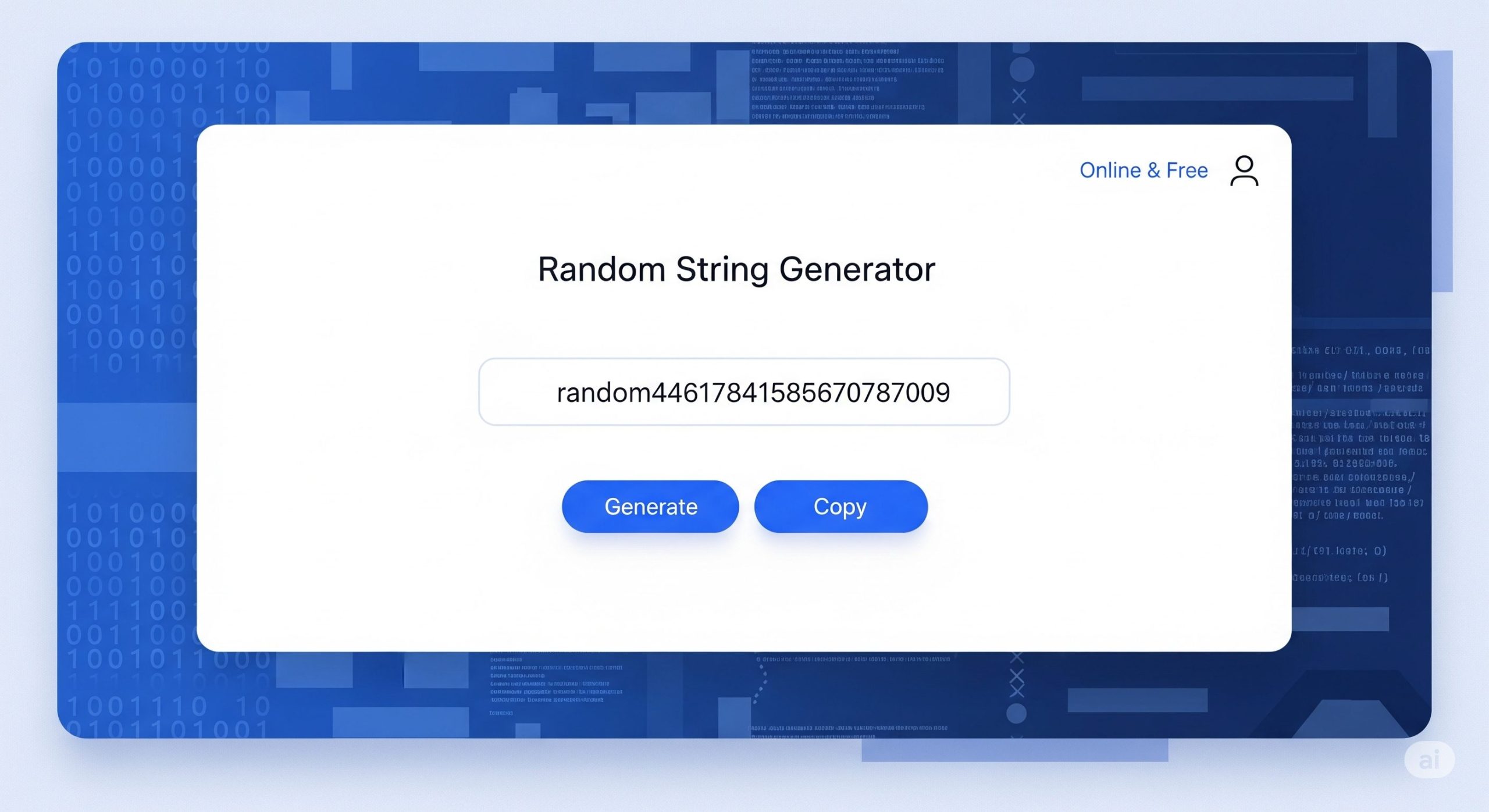Need a powerful, secure, and free Random String Generator? Discover how to create unbreakable passwords, API keys, and more with our online tool. Learn the secrets behind cryptographic security and elevate your digital defense today.
In an age where our digital lives are woven into the very fabric of our reality, the strength of our digital defenses often comes down to a simple, yet profoundly important element: a random string of characters. It sounds mundane, but this humble string is the bedrock of modern security. It’s the password protecting your financial data, the API key connecting your applications, and the session ID keeping your online accounts safe. But how do you create a truly random string? The answer lies in a high-quality Random String Generator.
This is not just another article. This is your definitive guide to understanding, utilizing, and mastering the power of random strings. We’ll delve deep into why they are critical for your security, explore their myriad uses beyond just passwords, and introduce you to an online Random String Generator that is not only free and powerful but also built on the principles of cryptographic security. Whether you’re a developer, a security professional, or simply a security-conscious individual, this guide will equip you with the knowledge and tools to create truly unpredictable character sequences that stand strong against digital threats.

What Exactly Is a Random String Generator?
At its core, a Random String Generator is a tool or algorithm designed to produce a sequence of characters that has no discernible pattern. Think of it as a digital lottery machine, but instead of pulling numbered balls, it pulls from a vast pool of letters (both uppercase and lowercase), numbers, and symbols.
The key word here is random. A human attempting to create a “random” password often falls into predictable patterns, using familiar words, dates, or sequences like qwe123. A computer, however, can be programmed to select characters with true impartiality, making the resulting string incredibly difficult to guess. A sophisticated Random String Generator acts as your personal digital locksmith, forging keys that are unique, complex, and tailored to your exact security needs.
But not all generators are created equal. The difference between a basic tool and an advanced one can be the difference between a flimsy screen door and a fortified vault. This guide will help you understand that crucial distinction.
Why You Need More Than Just “Random” – The Critical Role of a Secure Random String Generator
The internet is rife with “random” generators, but the term can be dangerously misleading. The real measure of a generator’s worth lies in its ability to produce cryptographically secure random strings. This is a critical distinction that underpins the entire field of digital security.
The Pitfall of Predictability: Pseudo-Random vs. Cryptographically Secure
Most simple random functions in programming languages are “pseudo-random.” They use a mathematical formula and a starting value (called a “seed”) to generate a sequence of numbers that appears random. However, if you know the formula and the seed, you can predict the entire sequence. For tasks like video games or simulations, this is perfectly fine. For security, it’s a catastrophe.
A cryptographically secure random string generator, on the other hand, sources its randomness from unpredictable physical phenomena. As explained in a detailed article by the security experts at Cloudflare, this is known as entropy. It might use sources like mouse movements, the precise timing of keystrokes, or even atmospheric noise. This high-quality entropy ensures that the output is genuinely unpredictable, even for an attacker with immense computing power. Our free online tool is built on this very principle, using the browser’s built-in crypto.getRandomValues() API, which is designed specifically for this level of security.
Unlocking the Power: Top 7 Practical Uses for a Random String Generator
While password creation is the most common application, the utility of a powerful Random String Generator extends far beyond that. Here are seven critical areas where these tools are indispensable.
1. Creating Unbreakable Passwords
This is the classic use case. A strong password is your first line of defense. By generating a long string (16+ characters) that includes uppercase letters, lowercase letters, numbers, and symbols, you create a password that is resistant to brute-force attacks, where attackers use software to guess millions of combinations per second.
2. Generating Secure API Keys and Access Tokens
Developers constantly need to generate keys for APIs (Application Programming Interfaces) and authentication tokens (like JWTs). These strings act as a password for applications, granting them access to specific data or services. A predictable API key is a massive security vulnerability, making a secure Random String Generator an essential tool in any developer’s toolkit.
3. Data Encryption and Salt Generation
When storing passwords, best practice dictates that you “hash” and “salt” them. A “salt” is a unique, random string that is added to each password before it’s hashed. This means that even if two users have the same password, their stored hashes will be different. This prevents attackers from using pre-computed “rainbow tables” to crack the passwords. Generating a unique, high-entropy salt for each user is a critical security measure.
4. Creating Unique Identifiers (UIDs)
From database primary keys to user session IDs and transaction references, systems often need to generate unique identifiers that are difficult to guess. If a session ID is sequential (e.g., 1001, 1002, 1003), an attacker could easily hijack other users’ sessions by simply guessing the next ID. A Random String Generator ensures these UIDs are non-sequential and unpredictable.
5. Software Testing and Development
Testers and developers often need to populate databases with large amounts of dummy data to test application performance and functionality. A random string tool can quickly generate thousands of unique usernames, passwords, and other text fields, saving countless hours of manual work.
6. Secure Coupon and Voucher Codes
For e-commerce businesses, generating unique, single-use coupon or gift card codes is vital. If codes are predictable (SALE10, SALE20), customers can easily guess other valid codes. A generator can create a list of thousands of complex, non-sequential codes (X7gT-9kLp-3zR1) that can be securely distributed.
7. Cryptography and Security Protocols
At the heart of protocols like SSL/TLS, which secures your web Browse, are random numbers used to generate session keys. The security of the entire encrypted connection depends on the quality of this initial randomness. This highlights the foundational importance of this technology across the entire internet.
Introducing Your Ultimate Online Random String Generator
Understanding the why is important, but having the right tool is paramount. We’ve developed a free, online Random String Generator that encapsulates all the principles of modern security and user-centric design. It’s more than just a simple generator; it’s a comprehensive solution for all your random data needs.
Our tool is engineered for both power and ease of use, providing a seamless experience without compromising on security. It operates entirely within your browser, meaning your generated strings are never sent to our servers, ensuring complete privacy.
How to Use Our Free Random String Generator: A Step-by-Step Guide
We’ve designed the interface to be intuitive and efficient. Here’s how to get the perfect random string in seconds:
- Set the String Length: Use the String Length slider or the corresponding number box to define how long you want your string to be. For strong passwords, we recommend a minimum of 16 characters.
- Define the Character Sets: By default, all character types are included for maximum strength. You can easily customize this by checking or unchecking the boxes for Uppercase (A-Z), Lowercase (a-z), Numbers (0-9), and Symbols (!@#$%).
- Choose the Quantity: If you need more than one string, simply change the value in the Number of Strings field. The tool will generate each one on a new line in the output box.
- Engage Advanced Options: For added security and readability, enable the Exclude Similar Chars option. This will remove potentially confusing characters like
I,l,1,O, and0. - Generate and Review: Click the large “Generate String(s)” button. Your secure, random strings will instantly appear in the output box. The integrated Strength Meter will give you a visual indication of how robust your generated string is, moving from red (weak) to green (very strong).
- Copy with One Click: Hover over the output box and click the “Copy” button. The full text is now on your clipboard, ready to be pasted wherever you need it.
Beyond the Basics: Advanced Features That Set Our Tool Apart
Any tool can generate a random string. A great tool empowers the user with control and insight. Here’s what makes our Random String Generator stand out:
- Real-time Strength Analysis: The dynamic strength meter doesn’t just check length. It analyzes the entropy of your string based on the character sets used, giving you instant feedback on its security level.
- Bulk Generation: Need 50 API keys for a new project? No problem. Generate up to 50 unique strings at once, saving you from repetitive clicks.
- Readability Control: The “Exclude Similar Characters” feature is a seemingly small detail that has a huge impact on usability, preventing frustrating mix-ups when a string needs to be manually transcribed.
- Privacy-First Design: As mentioned, everything is processed on your device (client-side). Your settings and your generated strings never leave your computer.
The Hidden Dangers of Using a Weak or Compromised Generator
Using a subpar tool is often worse than using no tool at all, as it provides a false sense of security. The risks are real and significant. According to the Open Web Application Security Project (OWASP), insecure randomness is a recognized vulnerability that can lead to severe security breaches.
Weak generators that use pseudo-random algorithms can produce predictable patterns. Attackers who understand these patterns can drastically reduce the time it takes to brute-force a password or guess an API key. They aren’t guessing from trillions of possibilities anymore; they’re exploiting a flawed system. This is why choosing a Random String Generator that explicitly uses a cryptographically secure source of randomness is non-negotiable for any sensitive application.
Conclusion: Your First Step Towards Stronger Digital Security
In the complex landscape of cybersecurity, we often focus on sophisticated firewalls and anti-malware software. Yet, the strength of our entire digital fortress can be compromised by a single weak link—a predictable password, a guessable token, a poorly generated key.
Mastering the art of randomness is a fundamental step toward robust security. By understanding the difference between simple and secure randomness and by utilizing a high-quality tool, you empower yourself to close critical security gaps.
We invite you to bookmark and use our free online Random String Generator. It’s more than just a utility; it’s a commitment to your digital safety. Generate your next password, your next API key, or your next unique identifier with the confidence that it was forged with the highest standards of security in mind. Start building a more secure digital future today.
Frequently Asked Questions (FAQ)
Is this Random String Generator truly free to use?
Absolutely. Our online tool is 100% free with no hidden costs, subscriptions, or usage limits. We believe fundamental security tools should be accessible to everyone.
Are the strings I generate stored on your servers?
No, and this is a critical privacy feature. The entire generation process happens locally in your web browser (client-side). We never see, record, or store the strings you create, ensuring your data remains completely confidential.
What makes a random string “cryptographically secure”?
A cryptographically secure string is generated using a source of high entropy, or true randomness, making it unpredictable. Our tool uses the browser’s crypto.getRandomValues() function, which is specifically designed for security-sensitive applications like key generation, distinguishing it from simpler, predictable (pseudo-random) generators.
What is the ideal length for a secure password?
Security standards evolve, but as of today, a minimum of 16 characters is highly recommended for any important account. For critical systems, 20-25 characters including a mix of all character types (uppercase, lowercase, numbers, and symbols) provides exceptional protection against brute-force attacks.
Can I use this tool to generate multiple unique strings at once?
Yes. Our tool includes a “Number of Strings” feature. You can enter any number up to 50, and it will generate a list of unique random strings, each on a new line, perfect for when you need to create multiple accounts, API keys, or coupon codes.


